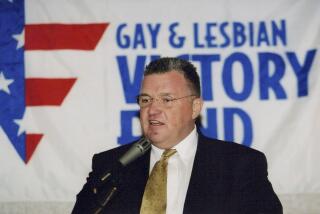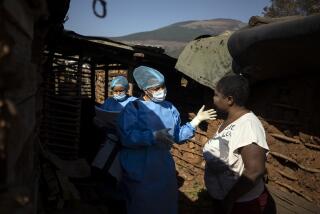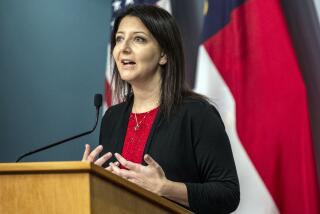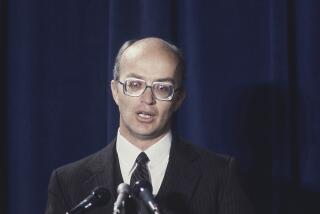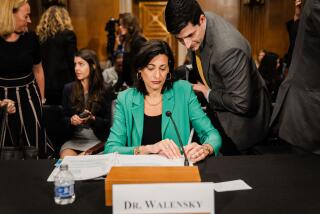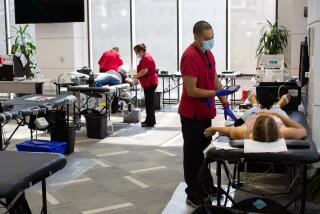Mayo Official to Head AIDS Panel : Reagan Commission to Make Long-Range Policy Suggestions
President Reagan selected the chief executive officer of the Mayo Foundation as chairman of an 11-member presidential commission that will make long-range policy recommendations on the AIDS epidemic, the White House announced Thursday.
W. Eugene Mayberry, an endocrinologist at the Rochester, Minn., clinic who is virtually unknown by those involved in AIDS treatment and research, was described by a White House official as “a man of good medical credentials” who “appears to have an open mind on most of the issues debated about AIDS.”
The move follows controversy over a decision by the Administration not to appoint to the panel someone specifically because he or she is homosexual. This refusal to make sexual orientation a factor in the appointments has drawn sharp protests from the nation’s leading AIDS researchers.
‘Not a Relevant Issue’
“It’s not a relevant issue. We won’t select on that basis. We want the best people on the board and that’s the only issue,” White House spokesman Marlin Fitzwater said.
Mayberry has had no extensive medical experience in the fight against the deadly disease. One White House source, speaking on condition of anonymity, said: “If they were making a list of AIDS experts, I don’t know that his name would show up.”
However, he said, the commission “won’t be making medical decisions as much as it will be thinking about long-range problems--and everything in his background indicates that he is a thoughtful, intelligent man.” And the commission, once fully constituted, will include those “on anybody’s list of AIDS experts,” he added.
Mayberry, 57, has been affiliated with the Mayo Clinic since 1960. He has been chairman of its board of governors since 1976.
‘Relevant Disciplines’
Fitzwater said the other members of the commission would be appointed “within the next few weeks.” He said they would be “distinguished individuals who have experience in such relevant disciplines as medicine, epidemiology, virology, law, insurance, education and public health.”
The commission is being created to recommend steps that federal, state and local officials can take to protect the public from the virus associated with AIDS, assist in finding a cure for the fatal disease and care for those suffering from it. It is to issue a preliminary report within 90 days of its creation and a final report by next June 24.
The decision to appoint Mayberry--and the White House position of not appointing a gay person to the commission specifically to represent homosexuals--drew criticism almost immediately.
“Why the heck did they put an endocrinologist in as head of the AIDS commission? Why not an immunologist or a cancer specialist? He doesn’t have any feeling for these kinds of patients. They should have some gay people on the commission, so they’d be heard,” said a government physician involved in the treatment of AIDS patients. Endocrinologists treat diseases of the glandular system.
‘A Very Good Partner’
Eric Engstrom, executive director of the Minnesota AIDS project, said the Mayo Clinic has “discouraged people with AIDS from coming there.” But, he said, because AIDS patients often prefer being treated in hospitals close to their homes--and the Mayo facility is somewhat “isolated” in location--the clinic’s attitude “was not necessarily for a bad reason.”
Dr. Michael Osterholm, Minnesota state epidemiologist, said that under Mayberry’s leadership, “the Mayo Clinic has been a very good partner in public health efforts here in Minnesota. It has been very supportive of our efforts to deal with AIDS in Minnesota.”
Rep. Henry A. Waxman (D-Los Angeles), chairman of the House Energy and Commerce subcommittee on health, said he knows nothing about Mayberry but is “skeptical” about the commission. “If it can serve as a way of dealing with the epidemic in a nonpartisan way--as a medical problem and not a political one--it will have served a very useful purpose,” Waxman said.
After remaining silent on the epidemic until recent months, President Reagan announced on May 31 his support for increased “routine” testing of individuals, and called on the states to offer testing to marriage license applicants and those seeking treatment in drug abuse and sexually transmitted disease clinics. He also said he would seek mandatory testing of immigrants, federal prisoners and veterans hospital patients.
More to Read
More to Read
More to Read
Start your day right
Sign up for Essential California for news, features and recommendations from the L.A. Times and beyond in your inbox six days a week.
You may occasionally receive promotional content from the Los Angeles Times.
